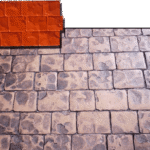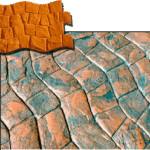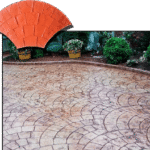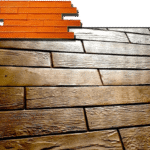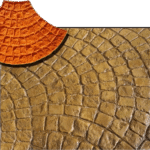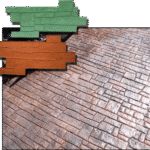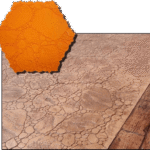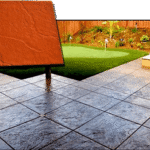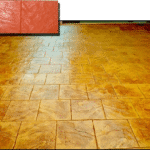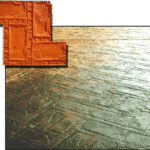Stone Wall Application
Ece Surfacing - Stamped Concrete - Stamped Concrete Molds - Stamped Concrete ApplicationsEce Surface - Stamped Concrete - Construction Chemicals
Stone Wall Application
Stone wall applications are one of the popular solutions preferred to achieve a natural and aesthetic appearance in both interior and exterior spaces. Thanks to its durability, longevity and the visual richness it adds to spaces, stone walls have a wide range of uses from architecture to decoration. In this article, you can find detailed information about the advantages of stone wall applications, areas of use and the application process.
Stone Wall Application: A Complete Guide
Stone walls are timeless architectural elements used in both modern and traditional construction. They serve not only as structural components but also as decorative features that add character, durability, and natural elegance to any space.
Applications of Stone Walls
Stone wall applications are diverse and include:
1. Exterior Applications
Retaining walls (landscaping and erosion control)
Boundary walls
Building facades / cladding
Outdoor fireplaces & grills
Garden borders & planters
2. Interior Applications
Accent walls (living rooms, entryways)
Fireplace surrounds
Bathroom or shower features
Wine cellars or rustic kitchens
Types of Stone Used
Each stone type offers a different look, texture, and durability:
| Stone Type | Appearance | Use Case |
|---|---|---|
| Limestone | Soft, light tones | Elegant interiors, wall cladding |
| Granite | Hard, speckled, durable | Exterior structural walls |
| Slate | Dark, smooth, layered | Modern interiors, wet areas |
| Fieldstone | Rustic, irregular shapes | Landscaping, outdoor features |
| Sandstone | Warm colors, textured | Mediterranean-style designs |
| Marble | Veined, polished, luxurious | High-end interiors |
Tools & Materials Needed
To apply stone walls (dry or mortared), the following are essential:
Trowel and pointing tools
Level and plumb line
Measuring tape
Angle grinder or wet saw (for cutting stones)
Mortar mix or stone adhesive
Wire mesh or cement board (for veneer)
Safety gear (gloves, eye protection)
Grout bag (if jointing)
Our website provides general information on the stamped concrete solutions you need for your property, construction site, villa, park, or garden. Our team will be happy to provide you with customized solutions based on your detailed requests.Installation Methods
1. Dry-Stacked Stone Wall (No Mortar)
Used mainly in landscaping and freestanding garden walls.
Steps:
Prepare a solid base with gravel and compacted soil.
Lay stones from largest to smallest.
Stack with tight-fitting joints.
Use small filler stones for stability.
Pros: Natural look, reusable.
Cons: Limited height, not water-sealed.
2. Mortared Stone Wall
Ideal for structural or retaining walls, this uses mortar between stones.
Steps:
Prepare foundation with concrete footing.
Lay stones with mortar (start at corners).
Use a level to keep lines straight.
Fill joints and tool them for a clean look.
Cure and seal for moisture resistance.
Pros: Strong, permanent.
Cons: Labor-intensive, needs curing time.
3. Stone Veneer (Thin Stone Cladding)
Used for interior walls, facades, fireplaces – gives the look of stone with less weight.
Steps:
Attach metal lath or cement board to wall.
Apply scratch coat and let dry.
Butter the back of each stone with adhesive.
Press stones onto surface, starting from bottom.
Grout joints (if needed) and seal.
Pros: Lightweight, easier installation.
Cons: Not structural, may need periodic maintenance.
Design Tips
Random Patterns: Mix sizes and colors for a rustic feel.
Linear Patterns: Clean, modern look using rectangular cuts.
Arch or Keystone Details: Add sophistication to fireplaces or openings.
Backlighting: Highlight texture using recessed or LED lighting.
Maintenance & Sealing
Stone walls, especially natural stone, need proper care:
Use penetrating sealers for water and stain protection.
Clean with pH-neutral stone cleaners.
Avoid acidic or harsh chemicals (especially for limestone or marble).
Inspect joints and reseal every few years if exposed to weather.
Advantages of Stone Wall Applications
Aesthetic Appeal: Timeless beauty and texture
Durability: Withstands weather, fire, and pests
Insulation: Natural thermal mass helps regulate temperature
Low Maintenance: Especially compared to wood or painted surfaces
Adds Property Value: Often associated with luxury and craftsmanship
Pro Tips
Always do a mock-up section before full installation.
Use a stone mix from different pallets to avoid color blotching.
For exterior walls, ensure proper drainage behind stone to prevent freeze-thaw damage.
Indoors, always consider the wall load-bearing capacity, especially with real stone.

